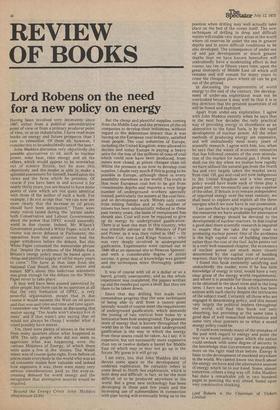The
Spectator July 12, 1975
position when drilling may well actually take place on the bed of the ocean itself. The new techniques of drilling in deep and difficult waters will enable very many areas in the world where oil reserves lie under the sea in greater depths and in more difficult conditions to be also developed. The consequence of under-sea oil and gas development at much greater depths than we have known heretofore will undoubtedly have a moderating effect in due course, say ten or fifteen years time, upon the great monopoly of Middle East oil which still remains and will remain for many years to come the cheapest place where oil can be got out of the ground.
In discussing the requirements of world energy to the end of the century, the development of under-sea exploration must not be overlooked because it may well be that it is in this direction that the greatest quantities of oil will be found and exploited.
Apart from under-sea exploration, I agree with John Maddox entirely when he says that in the next few decades the only practical way of providing energy in abundance as an alternative to the fossil fuels, is by the rapid development of nuclear power. All the other methods of producing energy are expensive, and will undoubtedly need many years of scientific research. I agree with him, too, when he says that the waste of economic resources that has followed consists of the over-stimulation of the market for natural gas. I think we shall rue the day when we realise how rapidly we have utilised the natural gas from the North Sea and very largely taken the market away from coal. Oil, gas and coal are now indigenous to the United Kingdom and a wise energy policy would have made each of these play a proper part, not necessarily one at the expense of the other. If Britain is to remain independent of imported energy over the next century, we shall need to explore and exploit all the three energies which we now have in our possession.
I am sure that he is right in suggesting that all the resources we have available for alternative sources of energy should be devoted to the development of nticlear reactors. In due course a good deal more scientific research is required to ensure that we take the right road to producing nuclear power. One of the problems is the high capital cost of building reactors rather than the cost of the fuel. As he points out in a very well reasoned chapter, the economics of nuclear power are much more closely determined by the capital cost of building reactors, than by the market price of uranium.
I found this book eminently satisfying and undoubtedly the reader, even if he has little knowledge of energy in total, would have a very clear grasp of the energy world requirements, and where it is possible for those requirements to be obtained in the short term and in the long term. I have not read a book which has been written with such clarity despite the intricacies of the subject itself. Certainly all those who are engaged in determining policy, and this means very largely the political leaders throughout the world, will find this book not only absorbing, but providing at the same time a good deal of well researched information and some very clear pointers as to what a sound energy policy could be.
It could even remedy many of the mistakes of the past with regard to energy and point the way to a sound policy upon which the nation could embark with some degree of security in the knowledge that Government was probably more on the right road than before. Energy is basic to the development of mankind anywhere in the world. We cannot know too much about the energy we have and the alternative sources of energy which lie to our hand. Some, almost tomorrow, others a long way off. John Maddox has done a remarkable job in two hundred • pages in pointing the way ahead, based upon very constructive thinking.
Lord Robens is the Chairman of Vickers Limited.


































 Previous page
Previous page